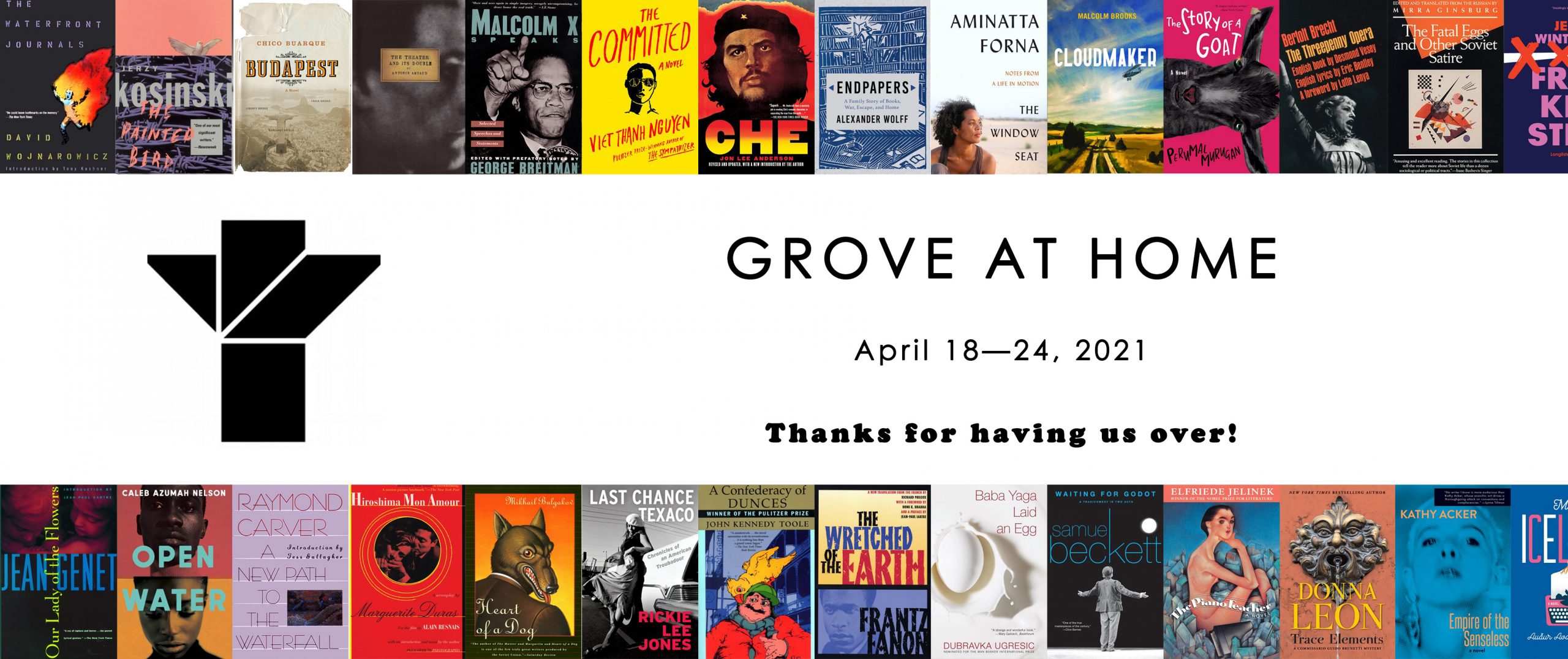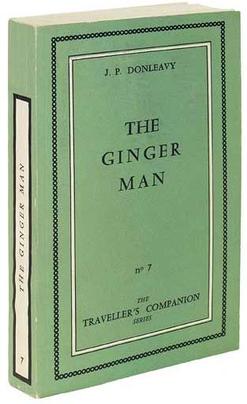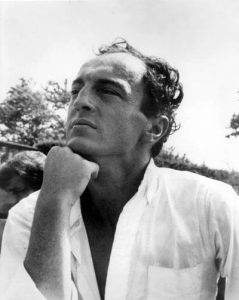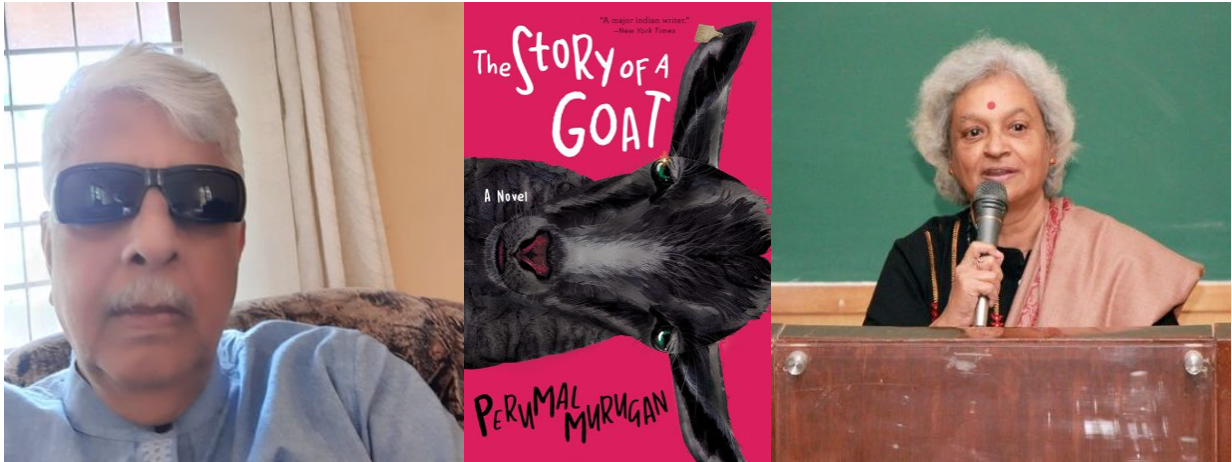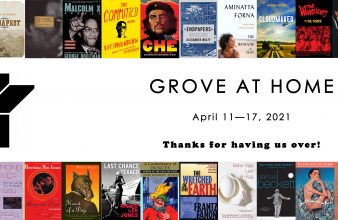News Room
Welcome to Grove at Home!
Every weekday, from now until we’re all out of the house again, we’ll be sharing a couple of links — some fresh, some from the vault — to say hi, remind you to keep reading, and let you know what’s on our minds.
Friday, April 23
Today would be the 95th birthday of the legendary American-Irish author J.P. Donleavy, whose bold — and, in its day, all but unpublishable — first novel, The Ginger Man, remains a classic that has inspired several generations of writers, been feted and emulated by publishers the world over, and, sixty-five years after it first appeared, never gone out of print. Born in New York City, he moved to Ireland after serving in the US Navy during World War II, and spent the rest of his life there, becoming a citizen in the late sixties.
Donleavy would go on to write more than twenty more acclaimed books, including A Fairy Tale of New York, The Beastly Beatitudes of Balthazar B, and many others.
In this wonderful, short video from 2005, Donleavy reads the final paragraph from The Ginger Man to a deeply appreciative crowd, while another master — Yoda — looks on approvingly from above.
The Ginger Man in the New York Times in 1958
Donleavy’s The Ginger Man was first published by the Paris-based Olympia Press, which had also published the likes of Samuel Beckett’s Watt and Jean Genet’s The Thief’s Journal — though Donleavy was livid to see his own work published under the press’s pornographic imprint, and proceeded to spend more than two decades repeatedly suing Olympia. Three years later, Norman Podhoretz — who would become famous as editor-in-chief of Commentary, and, years later, an ardent champion of Sarah Palin and Donald Trump — devoted some ink to the book in a New York Times column declaring “there is talent to burn among the new young writers and a marked desire to turn out serious literature rather than commercial fiction.” It’s a fascinating read today, with more than sixty years’ distance.
“There are, however, a few young novelists who are writing out of a sense of what the contemporary world is all about and who are trying to explore it relevantly and honestly. The best of them, I think, is J.P. Donleavy, whose raucous comic novel about an expatriate American heel in Dublin, ‘The Ginger Man,’ has a vitality that comes only in part from its energetic and exuberant prose. What really makes ‘The Ginger Man’ a vital work is the fact that it both reflects and comments dramatically on the absurdities of an age clinging to values in which it simply cannot believe and unable to summon up the courage to find out what its moral convictions really are.” Read the full article…
J.P. Donleavy wins the Lifetime Achievement Award at the Irish Book Awards
In 2015, when Donleavy was in his late eighties, he received the Lifetime Achievement Awards at the Irish Book Awards. After a video tribute produced by the Dublin-based Big Red Engine production company, featuring appreciations by Sinéad Gleeson, Bob Geldof, and others, Donleavy is introduced by Dónal Ryan, and, after another short video tribute by Johnny Depp, movingly accepts the award.
Thursday, April 22
Patricia Engel at AWP 2016
Author Patricia Engel is back in the public eye with the release of her newest book, Infinite Country. In this terrific interview shot at AWP 2016, Engel discusses her then-newly-released novel The Veins of the Ocean with PBS’s Rich Fahle, against the backdrop of the AWP bookfair. “People who live next to the ocean are a different kind of people.” Watch this at once!
Theodore R. Johnson on America’s treatment of Black veterans
“For longer than there’s been a United States, two things have been true: Black Americans have served in all their country’s wars, and racism has prevented them from tasting the fullness of the very freedom many of them died fighting for.” So writes Theodore R. Johnson in a stirring New York Times op-ed this week. Johnson, a Navy vet who’s increasingly one of America’s most sought-out voices on race, would know. With particular attention to the newsmaking recent assault on Army Second Lt. Caron Nazario, it’s both a stirring, urgent, edifying read, and a foretaste of Johnson’s When the Stars Begin to Fall, which we’ll be publishing this summer. Read it.
“I can’t remember the exact moment it occurred, but at some point early in my 20-year career in the U.S. Navy, I picked up a survival tactic. It wasn’t a novel technique for handling being stranded at sea or navigating out of a dense jungle in enemy territory; it was how to survive an encounter with American law enforcement.
“The maneuver was quite simple: Each time I was pulled over by police officers and they asked for my license and registration, the first thing I gave them was my military ID.” Continue reading…
Amiri Baraka: “Art speaks to people — that’s why they use it against you”
There truly is never a bad time to hear Amiri Baraka speak.
Wednesday, April 21
A visit to Punk magazine in 1977
In 1977, the Australian music show “Flashez” traveled to New York City for a tour behind the scenes at Punk magazine, including a lengthy interview with founders and editors John Holmstrom and “resident punk” Legs McNeil. More than forty years later, it’s a thrilling look at a culture in a state of wild ferment, spreading globally and only beginning to realize its influence. Holmstrom would go on to write for publications including Spin and the Village Voice, and spend a few years as publisher of High Times. McNeil would write a number of books, including, with Gillian McCain, Please Kill Me, the definitive oral history of punk that we published in 1996.
“There is no depression for a writer, but a return to the Self”: T on Patricia Highsmith
A few months ago, we marked the centenary of the brilliant, difficult Patricia Highsmith, a writer whose outsize, hard-to-understand personality stands alongside her many indelible books, as well as the numerous screen adaptations that have helped ensure the notoriety of characters like the devious Tom Ripley. Now in the New York Times’ T magazine, Rennie McDougall offers an intimate and fascinating look at Highsmith’s personality, with all its quirks, contradictions, and challenges — from her obsession with snails to her turbulent and all-eclipsing relationship with her mother, and much more.
“Who was Patricia Highsmith? Most answers warrant a rebuttal. The writer was a collision of contradictions, a woman for whom every aspect of herself (including being a woman) demanded internal debate. In her private life, she swung dramatically between polar states of desire and disgust. Her personal journals that she kept her whole life — separate from what she called her ‘cahiers,’ or notebooks in which she worked on her fiction — reveal a woman at the mercy of her emotional tides, drawn to the darkest corners of her psyche.” Continue reading…
How Rickie Lee Jones wrote Chuck E’s in Love
As Rickie Lee Jones’s memoir Last Chance Texaco continues to draw excited readers and rave reviews (the Boston Globe calls it “candid, cosmic, so cool,” while the Minneapolis Star Tribune writes it’s “terrific”), we’re enjoying this video, shot for Dutch TV in 2015, in which Rickie Lee muses on the origins of her first hit, Chuck E’s in Love.
Tuesday, April 20
Caleb Azumah Nelson on All Things Considered
Last week, we published Caleb Azumah Nelson’s debut novel, Open Water, to astonishing reviews. (For just one example, in the New York Times, Gabriel Bump writes that “Nelson’s poetic brilliance, his ability to balance the general and the specific, the ambient & the granular, makes for a salient achievement.”) Yesterday, Caleb appeared on NPR’s All Things Considered to discuss the book with Ari Shapiro. If you you missed it then, now’s your chance. “Something I was really conscious of was this level of vulnerability that I had to reach in order to even portray these two characters and to even write this book. But that isn’t limited just to their interactions. It also stretches to the interactions with the police and other kind of state-led violence, where there’s an inability to kind of hide. You’re front and center. And all of that is very raw.”
Frank O’Hara’s collaborations with Mario Schifano
Frank O’Hara’s connection to painting was primary and, in his work, ubiquitous. “I think I would rather be / a painter, but I am not,” he famous wrote in his poem “Why I Am Not a Painter,” and his epitaph, from his poem “In Memory of My Feelings,” is “Grace / to be born and live as variously as possible,” which refers slyly to that poem’s dedicatee, the painter Grace Hartigan. A story up today at Literary Hub examines O’Hara’s relationship to the Italian artist Maria Schifano. Like Andy Warhol, and other American artists to whom he is at times compared, Schifano had an influence that extended to far-out rock music and experiments in filmmaking. He and O’Hara were briefly neighbors in the sixties, and their collaborative works, as well as curator Francesco Guzzetti’s commentary, may just be the perfect thing today.
“Evocations of landscapes, both imaginary and real, harsh references to the trauma of the war and dramatic political events, personal notes, literary genres, witty mentions of fellow artists and intellectuals, ironic homages recur through the sheets. Such a project actually resonates with other projects undertaken by O’Hara before then, such as ‘Stones,’ the portfolio created with Larry Rivers.” Continue reading…
Well, it’s April 20th — a holiday to some, and one that can be legally celebrated in growing swathes of America. Here, to keep a literary flame alight in those celebrations, is the great Michael Pollan, speaking in 2008 about the history, uses, and current state of the cultivation of cannabis sativa.
Here’s the great Mark Haskell Smith, in a 2012 TV appearance:
Allen Ginsberg reads “America”
Allen Ginsberg’s poem “America” merits inclusion here for the celebrated line, “I smoke marijuana every chance I get.”
https://www.youtube.com/watch?v=aZQ1F45j8Vc
Monday, April 19
Yesterday would have been the 74th birthday of the utterly peerless Kathy Acker, uncompromising writer whose dedication to transgression, slant devotion to rule-breaking aesthetic forebears, and abiding love of any number of modes — including the critical, the pornographic, the disjunctive, the surreal, and, no less than any of these, the classic — have made her, perhaps against the odds, one of the most influential American writers of the twentieth century. To celebrate, here’s I Love Dick author Chris Kraus — who wrote the introduction to our anniversary edition of Acker’s classic Blood and Guts in High School, as well as the literary biography After Kathy Acker — discussing Acker’s life and work with On a Wave author Thad Ziolkowski.
N. Kalyan Raman on translation
Late last month, the Indian feminist author Ambai published an essay online in which she shared some memories of struggling to acquire English as a native speaker of Tamil, discussed some of the finer distinctions between these two languages’ modes of expression, and offered some thoughts about literature in translation. “Whether translations are seen as acts of subversions or acts of making a certain writing saleable,” Ambai writes, “I feel that they alter the original story from what it actually stands for and they unravel a story in ways in which it was never intended.” Yesterday, N. Kalyan Raman, whose translation of Perumal Murugan’s The Story of a Goat was nominated for a National Book Award when we published it in 2019, published an essay in response. “Ambai’s ideas of how a text is received and translated are outmoded,” Raman writes, “and hinge on the presumption of an author’s authority over their translator(s). Unfortunately, there is no reasonable basis for such a presumption.” A fascinating debate on an underattended subject.
“Speaking as a translator, I must say that it is impossible to alter the original story, distort its intention or give away its mysteries merely by the act of translating the text, word for word, sentence for sentence. However, a translator is a reader first, and no author can abridge a reader’s autonomy through authorial assertions over and beyond what is contained in the text.” Continue reading…
Rabih Alameddine: “It took five years of my life, and they expect me to talk about it in sixty seconds?”
If you haven’t heard it yet, there’s some excellent news afoot: The Wrong End of the Telescope, the latest novel by the sublime and inimitable Rabih Alameddine, is coming this fall! The book is an incredible human drama set in the infamous Moria refugee camp on the island fo Lesbos, following two astonishing protagonists, and a marvelous cast of vividly-drawn background characters, through a breathtaking story that is by turns tragic, hilarious, and beguiling. Autumn is still a ways away, so to help you remember to stay excited, here’s an all-too-brief clip of Rabih in his kitchen, hyping the then-upcoming release of his now-fervently-acclaimed National Book Award finalist An Unnecessary Woman, originally shot for the book’s Australian publisher, Text Publishing. Just a tiny slice of the distinctive wit and humanity that is Rabih Alameddine.
